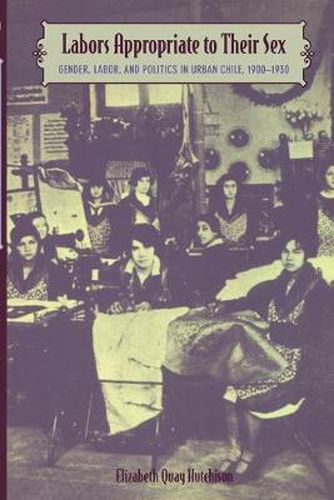Readings Newsletter
Become a Readings Member to make your shopping experience even easier.
Sign in or sign up for free!
You’re not far away from qualifying for FREE standard shipping within Australia
You’ve qualified for FREE standard shipping within Australia
The cart is loading…






This title is printed to order. This book may have been self-published. If so, we cannot guarantee the quality of the content. In the main most books will have gone through the editing process however some may not. We therefore suggest that you be aware of this before ordering this book. If in doubt check either the author or publisher’s details as we are unable to accept any returns unless they are faulty. Please contact us if you have any questions.
In Labors Appropriate to Their Sex Elizabeth Quay Hutchison addresses the plight of working women in early-twentieth-century Chile, when the growth of urban manufacturing was transforming the contours of women’s wage work and stimulating significant public debate, new legislation, educational reform, and social movements directed at women workers. Challenging earlier interpretations of women’s economic role in Chile’s industrial growth, which took at face value census figures showing a dramatic decline in women’s industrial work after 1907, Hutchison shows that their employment instead had shifted to informal or unofficial realms, such as sweatshops, making female labour disappear from census records at the same time that it was in fact burgeoning in urban areas. In addition to population and industrial censuses Hutchison culls published and archival sources to illuminate such misconceptions and to reveal how women’s paid labour became a locus of anxiety for a society confronting social problems-both real and imagined-that were linked to industrialisation and modernisation. The limited options of working women were viewed by politicians, elite women, industrialists, and labour organisers as indicative of a society in crisis, she claims, yet their struggles were also viewed as the potential springboard for reform. Labors Appropriate to Their Sex thus demonstrates how changing norms concerning gender and work were central factors in conditioning the behaviour of both male and female workers, relations between capital and labour, and public sentiment. This study will be rewarding for those whose interests lie in labour, gender, or Latin American studies; as well as for those concerned with the histories of early feminism, working-class women, and sexual discrimination in Latin America.
$9.00 standard shipping within Australia
FREE standard shipping within Australia for orders over $100.00
Express & International shipping calculated at checkout
This title is printed to order. This book may have been self-published. If so, we cannot guarantee the quality of the content. In the main most books will have gone through the editing process however some may not. We therefore suggest that you be aware of this before ordering this book. If in doubt check either the author or publisher’s details as we are unable to accept any returns unless they are faulty. Please contact us if you have any questions.
In Labors Appropriate to Their Sex Elizabeth Quay Hutchison addresses the plight of working women in early-twentieth-century Chile, when the growth of urban manufacturing was transforming the contours of women’s wage work and stimulating significant public debate, new legislation, educational reform, and social movements directed at women workers. Challenging earlier interpretations of women’s economic role in Chile’s industrial growth, which took at face value census figures showing a dramatic decline in women’s industrial work after 1907, Hutchison shows that their employment instead had shifted to informal or unofficial realms, such as sweatshops, making female labour disappear from census records at the same time that it was in fact burgeoning in urban areas. In addition to population and industrial censuses Hutchison culls published and archival sources to illuminate such misconceptions and to reveal how women’s paid labour became a locus of anxiety for a society confronting social problems-both real and imagined-that were linked to industrialisation and modernisation. The limited options of working women were viewed by politicians, elite women, industrialists, and labour organisers as indicative of a society in crisis, she claims, yet their struggles were also viewed as the potential springboard for reform. Labors Appropriate to Their Sex thus demonstrates how changing norms concerning gender and work were central factors in conditioning the behaviour of both male and female workers, relations between capital and labour, and public sentiment. This study will be rewarding for those whose interests lie in labour, gender, or Latin American studies; as well as for those concerned with the histories of early feminism, working-class women, and sexual discrimination in Latin America.